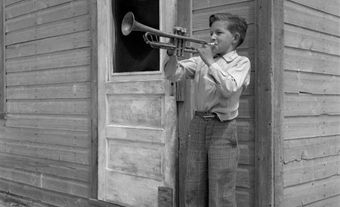Pierre Falcon (a.k.a. Pierriche, Pierre the Rhymer), poet, balladeer (born 4 June 1793 in Elbow Fort, Rupert’s Land, near present-day Swan River, MB; died 26 October 1876 in Grantown, now St. François Xavier, MB). Falcon worked as a fur trader, farmer and magistrate, but is best remembered as the author of many poems and ballads that recount the events and experiences of early Métis settlers. Falcon Lake, on the Manitoba-Ontario border, was named in his honour.

Early Years and Career
Named after his father, an employee of the North West Company (NWC), Falcon was baptized in Lower Canada at L’Acadie on 18 June 1798. It was here that, while living with relatives, he learned to read and write. When he was 15 years old, Falcon returned to the Red River where he also began his career as a North West Company clerk.
Falcon is known to have worked in many different areas including the northern regions of Lake of the Woods and Montagne la Bosse into the Qu'Appelle Valley, the Fort William-Rainy Lake district, while living at Fort Pelly. He had a multitude of jobs ranging from a clerk to traveling fur buyer.
Falcon married Marie Grant, the daughter of Cuthbert Grant Sr. and Marguerite, in 1812. Cuthbert Grant Jr., now Falcon’s brother-in-law, was a Métis leader and the Hudson’s Bay Company-appointed Warden of the Plains. Grant Jr. would be a major player in Falcon’s life as well as the Red River Resistance.
Falcon was an employee of the NWC from 1808 to 1821, and of the Hudson's Bay Company from 1821 to 1825, following the merger of the two firms.
Falcon followed Cuthbert Grant Jr., alongside many other Métis families to Grantown (now St. François Xavier, Manitoba) on the White Horse Plain. On the 1838 census, he was listed as living there with 30 acres of land. He farmed this land and was appointed the magistrate there in 1855.
Falcon was also listed as having six children while in Grantown, three daughters (Madeline, Isabelle and Marie) and three sons (Francois, Pierre and Jean Baptiste). From 1829-1837, Falcon and Marie Grant would have four more children, Julie, Catherine, Emelie and Gregoire.
Poet and Balladeer
Nicknamed Pierriche (“Pierre the Rhymer”), Falcon had a talent for putting local happenings and stirring events, such as the adventures of voyageurs and hunters, into song. The ballad “La Chanson de la Grenouillère,” for example, recounted the Seven Oaks Incident — a violent culmination of the bitter rivalry between the NWC and HBC that resulted in the death of 20 men. Métis sang the ballad across the land in the west and as far east as the St. Lawrence River in their travels as voyageurs. Songs would be sung around campfires and in communities as a way to celebrate their victories and remember their leaders.
The last verse of “La Chanson de la Grenouillère”:
"Now who is the singer of this song? Tis the local poet Pierre Falcon.
He wrote the song and it was sung
To mark the victory we had won.
He wrote the song that very day
To sing the praise of the Bois-brules."
Among his other songs that have survived are: “La Danse des Bois-Brûlés” (“Lord Selkirk at Fort William,” 1816), which tells another part of the Seven Oaks story and is attributed to Falcon, although he was never officially confirmed as the author; “Le Général Dickson” (“The Dickson Song,” 1837), about an adventurer who left Grantown that year to found an Indigenous kingdom in California.
“Les Tribulations d'un roi malheureux” (“Misfortunes of an Unlucky King,” 1869), another of Falcon’s songs protests William McDougall’s entry into the Red River Settlement and is sung to the tune of Fromental Halévy’s “The Wandering Jew.” During the Red River Resistance of 1869–70, though Falcon’s age was getting the best of him, he wanted to accompany the group of Métis heading to prevent Governor William McDougall’s entry into the settlement in October 1869. Falcon said, “While the enemy is occupied in dispatching me, my friends can strike hard and get in many good blows."
Falcon’s ballads were sung on the Prairies by the Métis to the accompaniment of the violin (crincrin), and were carried throughout Canada by voyageurs, from the St. Lawrence to the Mackenzie River. Many of his songs were lost because they were not written down, but all of the surviving ballads can be found in Margaret Arnett MacLeod's Songs of Old Manitoba (1960). In 2009, the Gabriel Dumont Institute released Pierriche Falcon: The Michif Rhymester, a CD and book featuring English and French-Michif renditions of Falcon’s songs, and an essay by Paul Chartrand, former member of the Royal Commission on Aboriginal Peoples, on the importance of Falcon’s work, Métis nationalism and the Michif language.
See also: Music of the Métis; Métis Settlements; Red River Resistance.
Honours
Though much of it is lost, Falcon is said to have composed many more songs about the triumphs and daily life of the Métis voyageurs. Agnes Laut’s “The buffalo hunt” has been recorded as being a romanticized translation of the lyrics of one of Falcon’s songs.
Falcon Lake in Whiteshell Provincial Park, about 150 km east of Winnipeg in Manitoba was named in Falcon’s honour.

 Share on Facebook
Share on Facebook Share on X
Share on X Share by Email
Share by Email Share on Google Classroom
Share on Google Classroom
